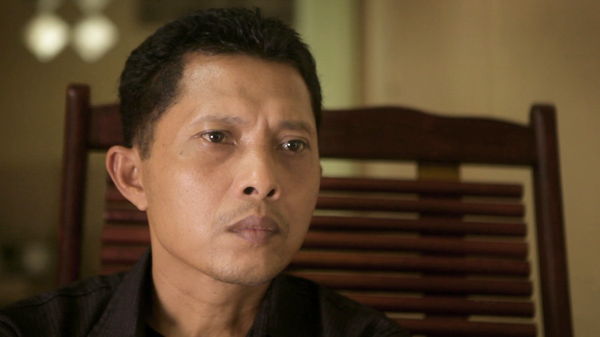![]() If you happened to have seen The Act of Killing when it was released two years ago (and subsequently earned an Oscar nomination, which it should’ve won) or on Netflix, you witnessed something that hasn’t been done before in film: a group of mass murderers, who took part (nay, led) the slaughter of up to a million supposed Communists in the mid-1960s in Indonesia, were given the chance to reenact many of their most heinous actions as if in making a movie.
If you happened to have seen The Act of Killing when it was released two years ago (and subsequently earned an Oscar nomination, which it should’ve won) or on Netflix, you witnessed something that hasn’t been done before in film: a group of mass murderers, who took part (nay, led) the slaughter of up to a million supposed Communists in the mid-1960s in Indonesia, were given the chance to reenact many of their most heinous actions as if in making a movie.
As they loved gangster movies and fancied themselves as slick criminals, they acted out their torture and murder scenes with sets and lighting, and they re-created what they did. It’s little wonder the documentary attracted the attention of Werner Herzog and Errol Morris (who are executive producers on this new film); it’s a document of people who have barely a lick of any sense that what they did had any negative impact whatsoever. One man, Anwar Congo, admits to killing about a thousand people.
This time director Joshua Oppenheimer turns his attention to a family who lost someone during these mass executions: Ramli, who, like so many others, was accused of being a Communist by the military. It’s actually Oppenheimer’s original onscreen collaborator from Killing, Ramli’s brother, Adi Rukun, who led Oppenheimer’s attention to some of the perpetrators.
Adi lives with his mother and father. She remembers well what happened to her murdered son. That she still lives in close proximity with those who were responsible for his death fills her with dread. They don’t talk when they pass each another, she says very simply. His father is older, to the point of dementia. There’s the possibility that the father, who needs to be washed and cared for regularly, may have forgotten that he ever had another son.
Through Oppenheimer’s connections and crew, Adi, an optometrist, visits several key people—ostensibly, for eye check-ups—who were involved with brutal slayings by a river bank in their village, and which took the life of Ramli. Adi is not out to get revenge. In fact, when he talks to one official, who still has some sort of ranking or form of power, he doesn’t say where he’s from. As his mother tells him, there could always be retribution from the suspicion of ties to Ramli, even today. In one sobering scene, Adi’s son is taught in a classroom how evil the Communists were and why they had to be taken out.
Adi’s questions are what drive the emotions of the film, the sense of inquiry and purpose. He asks very simple, direct questions. Many of the interviewees, varying from former hired guns to bureaucrats, are frail but hardened, and the point keeps coming up: Why bring up the past? What’s done is done. Some criticize Adi that his “political” questions will only open the wound again.
Maybe the most troubling interview of all is with Adi’s uncle, who was a guard at the prison where Ramli was briefly kept before being taken to slaughter. (Adi finds out about the details of what happened to his brother, and it’s 10 times more graphic and disturbing than any horror film.) Why did his uncle allow this to happen? He answers in effect that the victims were Communists, he didn’t kill anyone, and he was only following orders. Indeed, imagine a world where the Nazis never were held accountable for their crimes. This could be akin to Claude Lanzmann’s Shoah (1985). It’s that profound.
And yet, through all of these constantly compelling and, in their way, terrifying interactions, we are shown that human beings can be good and caring. Adi, as a father to his daughter, lives up to that, as he does with his father and mother. As in Killing, the film ends with a moment of despair, as Adi’s dad is in a room and doesn’t know where he is or what to do. Silence is ultimately, for one, about the persistence of memory and that the dead live on only for those who bring their lives to light.
If The Act of Killing is the more daring of the two, The Look of Silence is actually more emotionally satisfying, engrossing, and no less an essential film.

















Leave A Comment